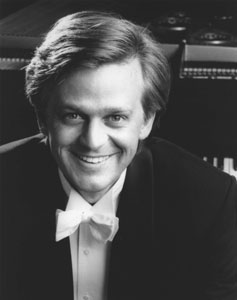![[Metroactive Music]](/music/gifs/music468.gif)
[ Music Index | Silicon Valley | Metroactive Home | Archives ]
Roman à Cleve
Symphony Silicon Valley welcomed back conductor George Cleve with open arms at weekend concerts
By Scott MacClelland
WHEN George Cleve conducted the first of three Symphony Silicon Valley subscription concerts in December, the orchestra blushed with self-conscious enthusiasm. It seemed to be saying "All is forgiven" to the man who had led the San Jose Symphony for two decades, and whom, at his departure in 1992, they were glad to see go. Last Sunday afternoon, Cleve's second appearance was nothing less than a love-in. Following an energized reading of Brahms' First Symphony, the orchestra welcomed Cleve into their midst like a politician who had just received the nod of his party, with hugs and kisses all around.
While Symphony Silicon Valley's personnel have changed since the demise of the San Jose Symphony, a large core group remains intact. Meanwhile, Cleve has himself mellowed, even though his powers as a musician burn as bright as ever. This was evident with the opening Mozart string work, Adagio and Fugue, K. 546. Cleve placed the two violin sections up front, left and right, to underscore the composer's antiphonal writing, and balanced the choirs in vivid relief against one another—an effect nicely enhanced by the efficient California Theatre acoustics.
Charismatic pianist Stephen Prutsman then took the stage for Mozart's Piano Concerto no. 22 in E-flat, a work full of youthful confidence—the composer/performer was at the height of his popularity in Vienna—and ebullient charm. A spirit of improvisation infuses the piece, inviting an ongoing spontaneity in the solo part. While Prutsman exploited this impulsive character with daring in his own refreshingly original solo cadenzas, his playing in ensemble with the orchestra, patrician and elegance, was rather studied. Among the concerto's delights is that startling glimpse of tragedy in the finale—tongue in cheek perhaps—just before the coda. The orchestra's winds positively shone in the reading. Prutsman rewarded the audience's enthusiasm with a winning morsel of his own, a sweet tease of "jazz" at the expense of Chopin that he called Choppin' Freddie.
The impulse of the Mozart concerto made the ensuing Brahms symphony sound positively stolid (removing any doubt as to why Tchaikovsky loved the former composer and hated the latter). What impulse exists in the heavily worked-out score is left almost entirely in the hands of the conductor. Bernstein's 1960 recording of the piece with the New York Philharmonic achieved a degree of passion that the piece rarely enjoys. Cleve understands this extremely well, massaging its pitfalls and building its climaxes with conviction and intensity.
The orchestra rose to the occasion, delivering a stirring account that provoked a noisy outburst of approbation from the full-house audience. Concertmaster Christina Mok gave her solo (with horn) in the slow movement a personal warmth that sweetened the composer's intellectually controlling prowess. In the finale, Meredith Brown delivered the hair-raising alpenhorn call with splendid tone and phrase while the higher strings dug deeply into their low registers for the much-loved chorale. When the cellos joined them for its reiteration, Cleve slowed the pace and shaped the phrase to increased effect. As an encore, Cleve sparked a brash reading of Brahms' first Hungarian dance.
[ Silicon Valley | Metroactive Home | Archives ]
Copyright © 2006 Metro Publishing Inc. Metroactive is affiliated with the Boulevards Network.
For more information about the San Jose/Silicon Valley area, visit sanjose.com.
![]()

Pianistics: Stephen Prustman gave a studied reading of Mozart's Piano Concerto no. 22.
Send a letter to the editor about this story to letters@metronews.com.
From the January 25-31, 2006 issue of Metro, Silicon Valley's Weekly Newspaper.